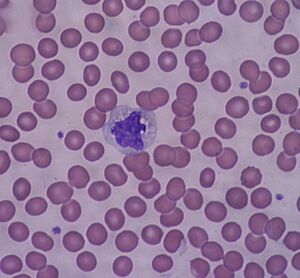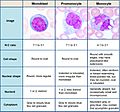Monocyte facts for kids

Monocytes are a special type of white blood cell that are part of your body's amazing immune system. Think of them as tiny defenders! You can usually spot them under a microscope because they have a large, often two-lobed, nucleus. Monocytes are like "reserve" cells. They can change into other important immune cells called macrophages and dendritic cells.
These monocytes work in two main ways to protect you:
- They slowly replace older macrophages and dendritic cells that are already in your body. This keeps your immune system strong all the time.
- If you get an infection or injury, monocytes can quickly rush to the affected area. This usually happens within 8 to 12 hours. Once there, they divide and change into macrophages and dendritic cells. These new cells then help fight off the infection and start the healing process.
Did you know that about half of all monocytes are stored in your spleen? The rest are busy traveling through your blood or are already in different tissues throughout your body.
What Monocytes Do
Monocytes are made in your bone marrow. They start as special young cells called monoblasts. After they are made, monocytes travel in your bloodstream for about one to three days. Then, they move into different tissues all over your body. They make up a small but important part (about three to eight percent) of all the white blood cells in your blood.
Once monocytes leave the bloodstream and enter your tissues, they change. They become either macrophages or dendritic cells. These new cells then stay in the tissue where they are needed. Macrophages are especially good at protecting your tissues from anything foreign or harmful. They are large cells with a big nucleus and lots of space inside (called cytoplasm) that helps them process foreign materials.
Monocytes, along with the macrophages and dendritic cells they become, have three main jobs in your immune system:
- Eating up germs (Phagocytosis): This is like a clean-up crew! Monocytes and macrophages can "eat" microbes (like bacteria) and other harmful particles. They then digest and destroy these materials. They can even kill your own infected cells if they have special antibodies to help.
- Showing off germs (Antigen Presentation): After digesting germs, tiny pieces of them might be left over. These pieces are called antigens. Monocytes and macrophages can "show" these antigens to other immune cells called T lymphocytes. This process, called antigen presentation, helps activate the T lymphocytes. They then create a specific immune response to fight against that particular germ.
- Sending signals (Cytokine Production): Sometimes, products from microbes can directly activate monocytes. When this happens, monocytes produce special signaling molecules called pro-inflammatory cytokines. These cytokines act like alarms, telling other immune cells to come and help fight the infection.
Images for kids
-
A scanning electron microscope (SEM) image of normal human blood. You can see red blood cells, several white blood cells (including a monocyte), and tiny platelets.
See also
 In Spanish: Monocito para niños
In Spanish: Monocito para niños
 | Ernest Everett Just |
 | Mary Jackson |
 | Emmett Chappelle |
 | Marie Maynard Daly |




